Intel X25-V in RAID-0: Faster than X25-M G2 for $250?
by Anand Lal Shimpi on March 29, 2010 8:59 PM ESTMissing TRIM - Does it Matter?
Clearly the performance of two X25-Vs in RAID 0 is great, but you do lose TRIM - isn't that a dealbreaker? Honestly, it depends. For sequential accesses, TRIM isn't necessary on the Intel drives. The X25 controller does a good job of aggressively cleaning and recycling NAND blocks and you'll pretty consistently write at peak performance if your workload is almost all sequential.
The more random your access pattern is, the more you'll miss TRIM. Thankfully desktops don't spend too much of their time randomly writing data across the drive, but I'd say a good 30% of most desktop writes are random to an extent. Over time, these random writes will build up and bring down the overall performance of your RAID array until you either secure erase the drives or write sequentially to all available free space.
There is one other option for curbing the performance degradation before it happens. Remember the relationship between spare area and write amplification:
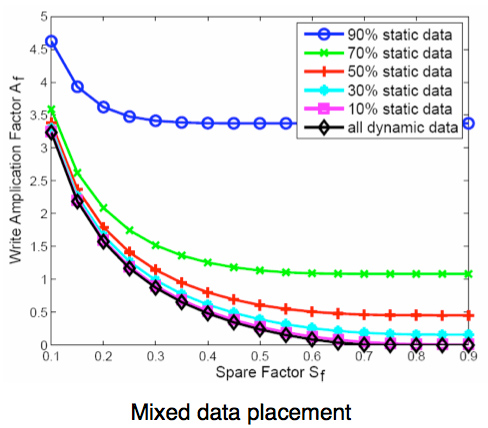
The more random your workload, the higher your write amplification (and thus the lower your performance, shorter your NAND lifespan). Increasing spare area can go a long way to reducing write amplification. While it can't eliminate it, it can definitely make a dent.
If you're looking to keep performance as high as possible with a pair of X25-Vs in RAID, you can always allocate more NAND as spare area. Secure erase each drive, create your RAID array, and then create your partition on the drive smaller than max capacity (try 10 - 20% smaller). The unpartitioned space should automatically be used by the controller as spare area. To test the effectiveness of this approach I took an X25-V, filled it with garbage data, and then wrote random data across the drive as fast as possible for 20 minutes. I then ran HD Tach to get a visualization of write latency (expressed by sudden drops in bandwidth) vs. LBA:
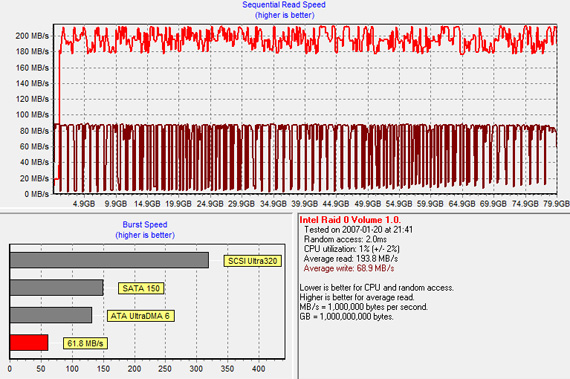
A standard 80GB X25-M wouldn't be this bad off, the X25-V gets extra penalized by having such a limited capacity to begin with. You can see that the drive is attempting to write at full speed but gets brought down to nearly 0MB/s as it has to constantly clean dirty blocks. Constant TRIMing would never let the drive get into this state. It's worth mentioning that a desktop usage pattern shouldn't get this happen either. Another set of sequential writes will clean up most of this though:
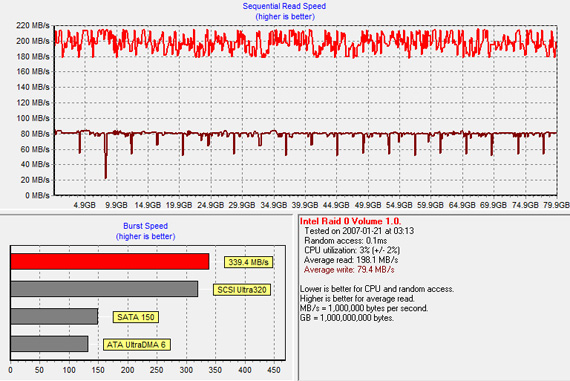
Intel's controller is very resillient. Even without TRIM, as long as your access pattern has some amount of a sequential component you'll be able to eventually recover performance.
Now look at what happens if we only use 60GB of the 74.5GB RAID 0 array upon creation and run the same test:
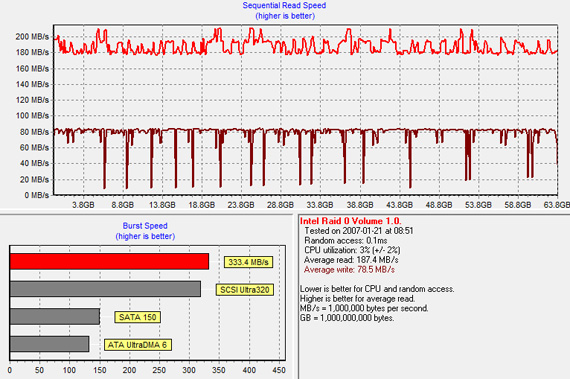
Performance isn't nearly as bad. That added spare area really comes in handy. Of course another pass corrects nearly everything:
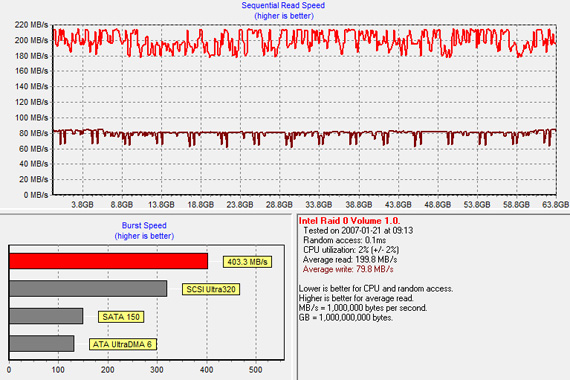
If you don't need the added space, using a smaller partition is a great way to ensure high performance for as long as possible. The effectiveness of this approach is a difficult thing to benchmark given that it's only after months of normal use that you get enough random writes to the drive to be a problem. The good news is that even if you bombard the X25-Vs with random writes, the drives can quickly recover as soon as they're hit with some sequential data.










87 Comments
View All Comments
galvelan - Friday, April 2, 2010 - link
Looks forward to the info Annihilus.GullLars - Saturday, April 3, 2010 - link
Damn, that's a lot of RE:'sAnyways, i thought i'd post it here so everyone could see:
The numbers he's refering to shows 16KB stripe as superior performance-wise.
Here's the PCmark vantage HDD scores of 3 x25-V's in RAID-0 by stripe size:
16KB: 74 164
32KB: 70 364
64KB: 63 710
128KB: 55 045
For those wondering, 16KB shows 540MB/s read and 131MB/s write in CrystalDiskMark 3.0 while 128KB shows 520MB/s read and 131MB/s write (1000MB lenght, 5 runs)
Also, here are the AS SSD total scores by stripe size for 3 x25-V's in RAID-0:
16KB: 809
32KB: 797
64KB: 795
128KB: 774
By doing PCmark vantage points multiplied by 2/3, i guess Anand used a 128KB stripe.
If he'd used a 16KB stripe, the numbers would likely be around 48-49 000
This is supported by benchmarking done by the user Anvil, who got 47 980 points in the Vantage HDD test with 2 x25-V's in RAID-0 off ICH10R with a 16KB stripe size. (IRST 9.6 driver, writeback cache disabled).
galvelan - Friday, April 2, 2010 - link
Excellent info GullLars... Think others are just thinking that 128k is best for all SSD's.. But they obviously are not all the same.. Thanx alot!!mschira - Tuesday, March 30, 2010 - link
Hi I like to get two 160 25-M for RAID. Linux software RAID to be precise.Can I use TRIM then?
best
M.
yacoub - Tuesday, March 30, 2010 - link
"earlier this month Intel launched its first value SSD: the X25-V."Last month.
The drive was definitely available in early February. Maybe you started writing this article in February? :)
buzznut - Thursday, April 1, 2010 - link
bought mine in January.Lithium - Tuesday, March 30, 2010 - link
Great test Mr. Anand.
Few weeks ago I purchased two Kingston 40GB drives to do just that, RAID-0.
Can you please explain which program you use for Secure Erase and in which enviroment, from DOS or Windows.
Next, when you create smaller 60GB partition, from DOS or from Win7 setup. Should I use quick format from Win7 setup...
All the best
Thanks
7Enigma - Tuesday, March 30, 2010 - link
Hi Anand,It it really as simple as copying a large file(s) to the free space of these SSD's in RAID to bring performance back to similar to a secure erase?
If so why doesn't Intel or some other 3rd party release a small program that simply uses My Computers' free space measurement, copy a file of the same size to the SSD and then delete it? Seems like it could be done very easily.
Thanks for the mini-review....makes me want to get another 80gig G2 to RAID with my current one!
mervincm - Tuesday, March 30, 2010 - link
I think this app does exactly that. You can even pick if it writes )'s or 1'smervincm - Tuesday, March 30, 2010 - link
Freespacecleaner AS-Clean